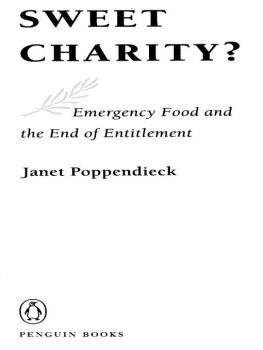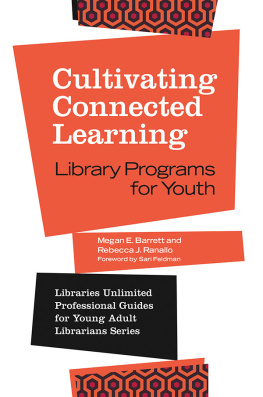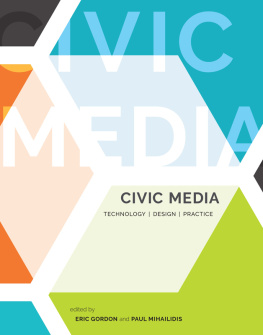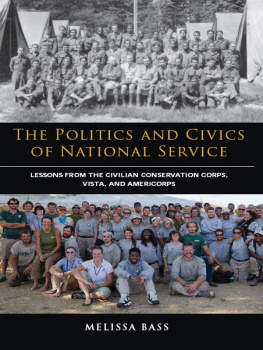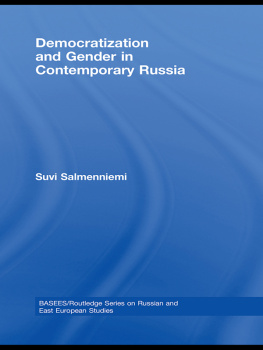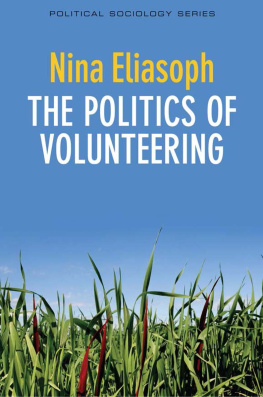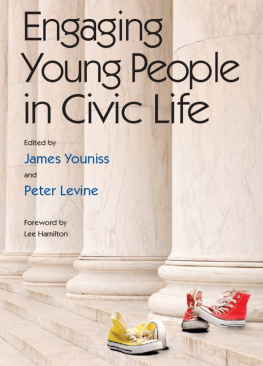Eliasoph - Making volunteers: civic life after welfares end
Here you can read online Eliasoph - Making volunteers: civic life after welfares end full text of the book (entire story) in english for free. Download pdf and epub, get meaning, cover and reviews about this ebook. City: United States, year: 2017, publisher: Princeton University Press, genre: Politics. Description of the work, (preface) as well as reviews are available. Best literature library LitArk.com created for fans of good reading and offers a wide selection of genres:
Romance novel
Science fiction
Adventure
Detective
Science
History
Home and family
Prose
Art
Politics
Computer
Non-fiction
Religion
Business
Children
Humor
Choose a favorite category and find really read worthwhile books. Enjoy immersion in the world of imagination, feel the emotions of the characters or learn something new for yourself, make an fascinating discovery.

Making volunteers: civic life after welfares end: summary, description and annotation
We offer to read an annotation, description, summary or preface (depends on what the author of the book "Making volunteers: civic life after welfares end" wrote himself). If you haven't found the necessary information about the book — write in the comments, we will try to find it.
Eliasoph: author's other books
Who wrote Making volunteers: civic life after welfares end? Find out the surname, the name of the author of the book and a list of all author's works by series.
Making volunteers: civic life after welfares end — read online for free the complete book (whole text) full work
Below is the text of the book, divided by pages. System saving the place of the last page read, allows you to conveniently read the book "Making volunteers: civic life after welfares end" online for free, without having to search again every time where you left off. Put a bookmark, and you can go to the page where you finished reading at any time.
Font size:
Interval:
Bookmark:
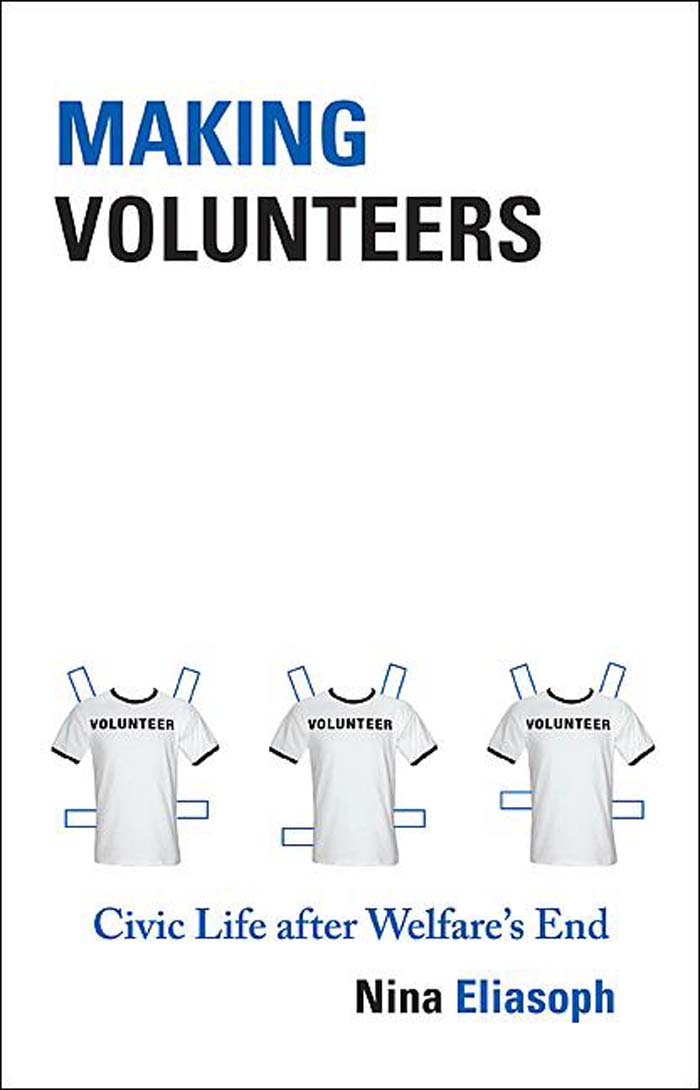
Making Volunteers
Princeton Studies in Cultural Sociology
S ERIES E DITORS :
Paul J. DiMaggio, Michle Lamont, Robert J. Wuthnow, Viviana A. Zelizer
A list of titles in this series appears at the back of the book
CIVIC LIFE AFTER WELFARES END
Nina Eliasoph
PRINCETON UNIVERSITY PRESS PRINCETON AND OXFORD
Copyright 2011 by Princeton University Press
Requests for permission to reproduce material from this work should be sent to Permissions, Princeton University Press
Published by Princeton University Press,
41 William Street, Princeton, New Jersey 08540
In the United Kingdom: Princeton University Press,
6 Oxford Street, Woodstock, Oxfordshire OX20 1TW
All Rights Reserved
British Library Cataloging-in-Publication Data is available
Library of Congress Cataloging-in-Publication Data
Eliasoph, Nina.
Making volunteers : civic life after welfares end / Nina Eliasoph.
p. cm. (Princeton studies in cultural sociology)
Includes bibliographical references and index.
ISBN 978-0-691-14709-3 (hbk. : alk. paper) 1. VoluntarismUnited StatesCase studies. 2. Young volunteers in community developmentUnited StatesCase studies. 3. Volunteer workers in community developmentUnited StatesCase studies. 4. Community developmentUnited StatesCase studies. I. Title.
HN90.V64E425 2011
361.00683dc22 2010048925
Printed on acid-free paper.
press.princeton.edu
Printed in the United States of America
10 9 8 7 6 5 4 3 2 1
CHAPTER 1:
How to Learn Something in an Empowerment Project
CHAPTER 2:
Participating under Unequal Auspices
CHAPTER 3:
The Spirit that Moves Inside You: Puzzles of Using Volunteering to Cure the Volunteers Problems
CHAPTER 4:
Temporal Leapfrog: Puzzles of Timing
CHAPTER 5:
Democracy Minus Disagreement, Civic Skills Minus Politics, Blank Reflections
CHAPTER 6:
Harmless and Destructive Plug-in Volunteers
CHAPTER 7:
Paid Organizers Creating Temporally Finite, Intimate, Family-like Attachments
CHAPTER 8:
Publicly Questioning Need: Food, Safety, and Comfort
CHAPTER 9:
Drawing on Shared Experience in a Divided Society: Getting People Out of Their Clumps
CHAPTER 10:
Getting Out of Your Box versus Preserving a Culture: Two Opposed Ways of Appreciating Cultural Diversity
CHAPTER 11:
Tell Us about Your Culture: What Participants Count as Culture
CHAPTER 12:
Celebrating... Empowerment Projects!
CONCLUSION:
Finding Patterns in the Open and Undefined Organization
APPENDIX 1:
On Justification
APPENDIX 2:
Methods of Taking Field Notes and Making Them Tell a Story
Like any scholarly book, this one is the fruit of many minds. Ilana Gershon, Jack Katz, and Laurent Thvenot each combed through many chapters, line-by-line; I am grateful to each of them for convincing me to make big changes, however ornery I may have been at the time. Many generous and thoughtful people read and gave helpful comments and critiques on field notes, multiple drafts, or papers that I wrote while puzzling my way through the book, including Daniel Cefa, Paul Dekker, Mike Edwards, Andreas Glaeser, Lynne Haney, Ron Jacobs, Michle Lamont, Caroline Lee, Patricia Paperman, Isaac Reed, Michael Schudson, Tommaso Vitale, Ed Walker, and Robert Wuthnow.
Faculty and staff at the University of Wisconsin and the University of Southern California have provided friendly and intellectually stimulating homes. A year at Princeton shifted my agenda when I discovered the literature on the nonprofit sector, thanks in part to Stanley Katz. The University of Wisconsin conducted a brave experiment in adjusting the work-family balance, by giving me a half-time, tenure-track position. To my mind, the experiment was a great success, and a blessing that I hope other academic parents get a chance to taste.
I have been lucky to have so many smart undergraduate and graduate students who make sure that my mind stays on its toes. One of the wonderful things about students is that they can become colleagues. I hope that Julian Charles, Jade Lo, Eeva Luhtakallio, and I continue to walk (or bike) the same path together for a long time.
Speaking of walking, I have traded stories about nonprofits, volunteering, and Empowerment Projects, while strolling at night to listen to crickets, sipping tea, savoring long meals, or exploring strange neighborhoods, with many beloved friends and colleagues: Hanan Afi, Jeffrey Alexander, Gianpaolo Baiocchi, Bob Bellah, Marc Breviglieri, Marion Carrel, Ann Crigler, Marcy Darnovsky, Sophie Duchesne, Mitch Duneier, Merija Eisen, Myra Marx Ferree, Shelly Freiberger, Lew Friedland, Tom Good-night, Neil Gross, Camille Hamidi, Arlie Hochschild, Leslie Hustinx, Dway May Ju, Ann Mische, Mary Nicholas, Jane Pilivian, Marion Smiley, Ann Swidler, Iddo Tavory, Carole Viaud-Gayet, Erik Wright, and Philip Ziegler.
While doing the research and writing, I gave several talks, many based on my raw fieldnotes before I had discovered what they meant. At Northwestern, UC Berkeley, UC San Diego, Yale, Radcliffe, the University of Chicago, Vanderbilt, the cole des hautes tudes en sciences sociales, the Institut dtudes politiques, the Royal Dutch Academy of Sciences, the Universit de Lyon, the Universit de Lille, and Helsinki University, fellow scholars helped me figure out what all my funny and sad stories meant.
Eric Schwartz, at Princeton University Press, has been a wonderful editor of the sort that is reputed no longer to exist: wise, subtle, kind, and often able to discern and organize my thoughts more clearly than I havea true master of his craft.
My children Olivia and Leo have provided endless entertainment, and have nobly argued with me in my most cynical moments, to show me, based on their own experience, how volunteers can change peoples lives. Nobody slept a lot, which is as it should be, because Nobody is our cat. My loyal husband, colleague, and lifetime collaborator, Paul Lichterman, and I have been together for twenty-five years now. Together, we have created articles, courses, reading groups, gardens, children, and a cozy home for enjoying each others love, insight, and care. I am more thankful for him than words can express here.
I greatly appreciate the many people who allowed me to observe, and participate in, their gatherings. This book is dedicated to the Emilys of the worldthe sensitive and energetic youth workers portrayed in this book who work so valiantly in such difficult circumstances to make peoples lives better, and often succeed. I hope this book helps make it easier for them to fulfill their missions.
Clarion calls to serve your community come at us from every direction lately. From the heights of national government to the lowly offices of nonprofits, we hear summons to volunteer, to participate, to build grassroots, multicultural community, and to become empowered. In everyday practice, these alluring ideas materialize in surprising ways, sometimes with consequences that are nearly the opposite of anyones intentions.
Youth programs are ideal places to witness those transformations. A program like Community House, for example, is a free after-school and summer program for low-income, mostly minority youth in Snowy Prairie, a mid-sized city in the American Midwest. One day, Community House won an award from the local Rotary Clubmoney to help buy a minivan. The group was told that it won the award for having done service to the community, and this made sense, since members had helped organize litter cleanups, food drives, and other events. Everyone was delighted with how well the award fit with the mission of empowering underprivileged youth. But when they got to the awards luncheon, the proud Community House youth volunteers read, on the list of award recipients: Community House: Van to transport needy youth. Emily, Community Houses adult organizer, told me, If Id have known [the list was gonna say that], I wouldnt have brought my kids at all. I wish they had not seen that. I dont pity them! If I did, Id spit on them. You cant pity people. Organizers and youth would often grow furious when such messages about statistics and crime were said within earshot of youth volunteers. Nonetheless, this kind of mistake was frequent and predictable in these organizations.
Font size:
Interval:
Bookmark:
Similar books «Making volunteers: civic life after welfares end»
Look at similar books to Making volunteers: civic life after welfares end. We have selected literature similar in name and meaning in the hope of providing readers with more options to find new, interesting, not yet read works.
Discussion, reviews of the book Making volunteers: civic life after welfares end and just readers' own opinions. Leave your comments, write what you think about the work, its meaning or the main characters. Specify what exactly you liked and what you didn't like, and why you think so.

